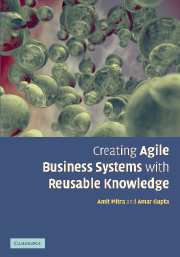Book contents
- Frontmatter
- Contents
- List of boxes
- List of figures
- List of tables
- Foreword
- Preface
- Acknowledgements
- Introduction
- 1 On the nature of reality and the nature of business
- 2 The object at the root of it all
- 3 The nature of attributes
- 4 Domains and their expression
- Appendix: Key shared components of knowledge
- Bibliography
- Index
3 - The nature of attributes
Published online by Cambridge University Press: 11 September 2009
- Frontmatter
- Contents
- List of boxes
- List of figures
- List of tables
- Foreword
- Preface
- Acknowledgements
- Introduction
- 1 On the nature of reality and the nature of business
- 2 The object at the root of it all
- 3 The nature of attributes
- 4 Domains and their expression
- Appendix: Key shared components of knowledge
- Bibliography
- Index
Summary
“Look to the rose that blows about us – ‘Lo, laughing,’ she says, ‘into the world I blow: At once the silken tassel of my purse Tear, and its treasure on the garden throw.’”
(From the Rubaiyat of Omar Khayyam)This chapter elaborates on properties of objects and constraints. It describes the metamodel of State, its components, configurations, patterns and constraints.
An attribute is a special kind of object. It is the repository of an irreducible fact that a specific rule or property of an object class exists.
Every object must have at least one attribute – the instance identifier that asserts that the object itself exists. This instance identifier must always be a nominally scaled attribute because it asserts a nominal irreducible fact – the existence of an object instance – whereas other properties of object may map to nominal, ordinal, difference, or ratio scaled domains.
The structure of attributes and states
Every attribute has three items of information associated with it – the object it describes, the kind of property it represents, and its value. The value is the actual property the object instance possesses. For example, length is a kind of property and the length of a room is an attribute of an object class called room. The fact that a room is 20 feet long asserts the (value of) length of a specific room, i.e. an instance of room.
- Type
- Chapter
- Information
- Creating Agile Business Systems with Reusable Knowledge , pp. 112 - 169Publisher: Cambridge University PressPrint publication year: 2007



